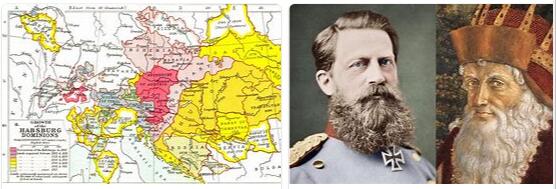But war seemed to make war ever more necessary; and the conflict overwhelmed the whole of Europe. France, although much smaller than the vast state of the Habsburgs, was by now a homogeneous and compact monarchy, with unique interests, with a robust financial and economic organization, while the dominions of Charles V were separated by great distances and by institutions, customs, different interests, had preserved their autonomy: rather than a single state they formed a federation of states. In the enemy camp, England, Scotland, Germany, Switzerland, Denmark, Hungary, Turkey, sometimes even some Italian states, all rose up against the threat of the universal empire and, on the other hand. to his theory, supporters of the antithetical one of interstate political balance as necessary “for the common freedom of Europe”. The Church, threatened by the Reformation, which seemed to want to implement the theocratic principle, and by Islam, which was the true realization of the theocracy, returned to support its full autonomy and to the theory of the secular empire opposed the theocratic one, while, of on the other hand, Luther destroyed religious unity itself and, with it, the ideal unity of the empire. Military enterprises began to upset the finances of Spain and the other Habsburg dominions, forced them to impose an absolutely unbearable tax burden, squandered American gold and silver: because, as it was said at that time, to pay the costs “seven Peru” would not have been enough. Then in vain was Charles V invited by his advisers to choose between an imperial policy and a national-Spanish policy; and the discussion arose at the death of Francesco II Sforza (1535), when the followers of the imperial tendency supported the opportunid of abandoning the duchy of Milan, whose annexation would have made a lasting peace with France impossible, the more serious European concerns about intentions of the Habsburgs and, due to the widening of the conflict, unsustainable costs for the war; while those in favor of a Spanish policy were more inclined to sacrifice Flanders and to preserve Milan, the possession of which was deemed necessary to strengthen the defense of the kingdoms of Naples and Sicily and to be able to dominate Genoa and have the help of his fleet in the fight against the Turk in the Mediterranean.
For Charles V the problem was of another nature. Undoubtedly, the youthful dream was over; but he had left in his soul an insatiable lust for power. And on the other hand it was still a question of defending the unity of the empire, the Burgundian and Spanish heritage: a set of dominions linked not by national or traditional ties, but only by his person, and, moreover, in the common defense program, one necessary for the other; because with the abandonment of Flanders he would have lost his homeland, to which he was deeply linked, his richest domain, one of the major centers of Spanish trade, the defense barrier of Germany, where the stances of Francis I had begun to give good results, the the only front on which it was possible to inflict a decisive defeat on France (and this was seen at San Quentin a few years later); while the abandonment of Milan would have meant the loss of one of the most important parts of the empire, as a Catholic and Italian part, the breakdown of direct communications between Germany and the Italian dominions, the weakening of the defense of the latter and in general of the Spanish dominance over the peninsula, and would have made the subjection of Genoa ephemeral, indispensable, as well as for the struggle in the Mediterranean, for the aid that its bankers granted to Spain and the empire. According to SPORTSQNA, under these conditions it was natural that he should consider the problem of the protection of his states as unique, such as to equally require a single, totalitarian and unitary solution; and that he should deem it necessary to defend them on all fronts and at the same time: being able to abandon any of the fronts will cause short-term defeat on the others as well. Thus for a longer time he navigated between the two solutions that had been proposed to him; and even if, after the failure of the expedition against Algiers in 1541, he postponed to a better time, which was equivalent to an abandonment, any African project and to the bitter end fight against the Turkish in the Mediterranean sector, and seemed to give the prevalence to imperial politics, on the other hand, he continued to keep for himself and Flanders and Milan; and to pay more attention to the empire was induced by the persuasion, confirmed by the following facts, that the dispute would be resolved there. But, faced with the religious problem, he, bound by tradition and, even if his education and his past had not forced him to follow the predominant and dominant faith in the most powerful part of his dominions, he remained Catholic and lost Germany. On the other hand, in an attempt to subjugate the Church to the empire, he unsuccessfully clashed with the resistance of the former, which in the struggle against the Reformation had begun to restore its energies and in the Counter-Reformation wanted to keep the leadership of the movement, intent on defending the its own cause and not that of the Habsburgs. Finally, in his exhausted dominions, in contrast with the personal policy of the monarch, the concrete interests of the individual national groupings were strengthened and passive resistances and revolts began. Then, Castile remained the only faith in its sovereign.
